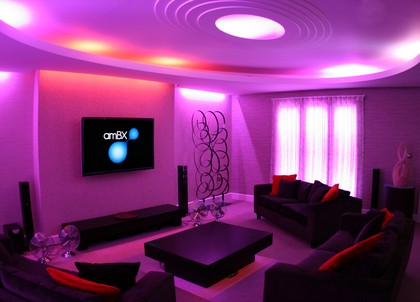Gaming in 2020: what the next decade holds
Industry plans motion and mind control, 3D MMOs and more
One company that has a strong interest in this area is the (previously Philips' owned) 'ambient' gaming specialists at amBX. That company's new CEO Neil Macdonald is one person who can certainly foresee a gaming world in ten years' time where the game experience has broken out of the confines of the screen/console/controller device paradigm and into the real 3D world of the gamer.
"Combining 3D video, HD projection and sensory ambient effects, such as those provided by amBX,as well as 'natural human interfaces', without hardware controllers, will create a 360 degree natural immersive experience in the room," Macdonald tells TechRadar.
"In fact the experience can be extended to other rooms which are part of the gameplay, thereby possibly turning the whole house into the game-zone. You will really feel as if you are inside the game – because you will be – and that is exactly what we know gamers are striving for."

IMMERSIVE: amBX man predicts ambient lighting and sound will augment gaming
And if all of that sounds like a little bit too much effort (after all, gamers are overly fond of their couches) then the amBX man adds that "your avatar can do that all for you, or engage in someone else's game-zone – basically, the game content and play can be mapped into the physical environment of the gamer and others can join in too so a player could 'host' a game which will open up new dimensions in classic gaming as well as social and network gaming."
And as our games develop to employ more human senses, we will be able to fight or outwit our opponents, even when we cannot see them, because we will start to sense their "actions and characteristics represented by nuances in the 3D environment with light, sound and motion."
Such technologies and new capabilities will also no doubt open up entirely new ways of designing group and family-based games, thinks Macdonald. "Public game-zone worlds can be opened up using the same technique, so there is a physical coming together in the gaming experience.
Sign up for breaking news, reviews, opinion, top tech deals, and more.
Sci-fi augmented reality contact lenses
Going beyond the current Hollywood 3D standard, there are already various forms of 'sci-fi' display tech that exist, such as 3D holographic projectors and augmented displays for and on contact lenses in development.
"Though that may be a bitter pill for the masses to swallow," laughs games developer Daniel Boutros, after considering their potential for gaming applications. "Glasses are a hard enough sell!"
"There'll always be a need to sit on a sofa and twiddle thumbs over having to run for real, through a holographically projected street while getting shot onto fake pavements, bleeding imagined streams of blood and feeling every bit of it, as exciting as that seems."
What is looking very likely indeed is the fact that by 2020 we should be able to render a convincing reality. In real time. Not necessarily every reality, but a good many. Which in turn then raises the thorny question: "What of the moral implications of rendering reality convincingly?" If you have an exact replica of yourself or your friends rendered into a game, could you not argue that you could have your throat cut or blow your mates' heads off in what will seem a rather alarming degree of realistic detail in your games.
"Well, you get that imitation of reality in movies at the moment and we let that go," says AMD's Richard Huddy. "It would be okay to watch a movie where someone's throat was cut. We have 18-certificates and we try to control where that shows up in people's lives.
"But by the time somebody is an adult, we let them make their own choices. As a general rule. As an example, I saw one of the recent Hostel movies and after fifty minutes or so I just walked out. It was too realistic. And I just don't want to see things like that. But to me that's my choice. I certainly don't want to stop it being on. I don't want to censor it.
"I most certainly would not say that I am unwilling to work towards achieving completely convincing avatars in games that look exactly like me, or that type of thing. I think that is an okay piece of tech. And it doesn't have to be misused."
Current page: The ultimate 3D gaming house
Prev Page New, infinitely-malleable 3D MMO worlds Next Page 2020: the 'holodeck' tipping point